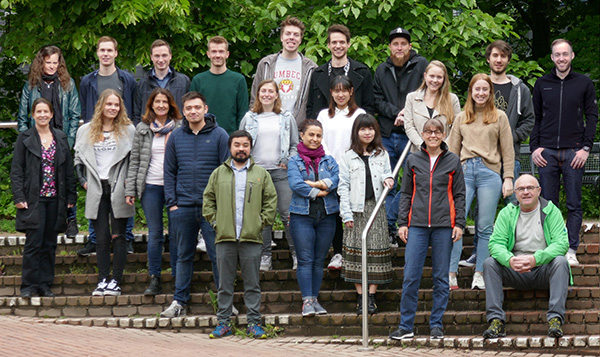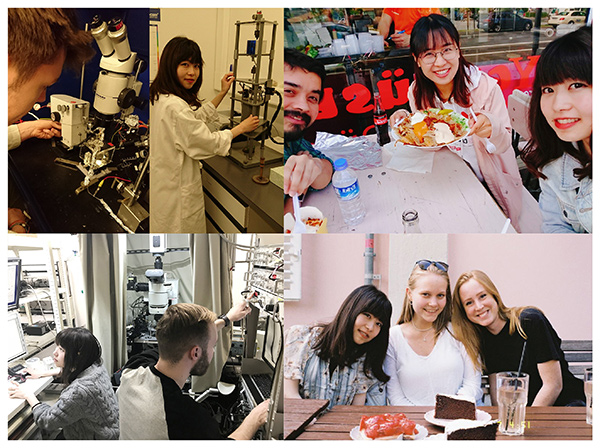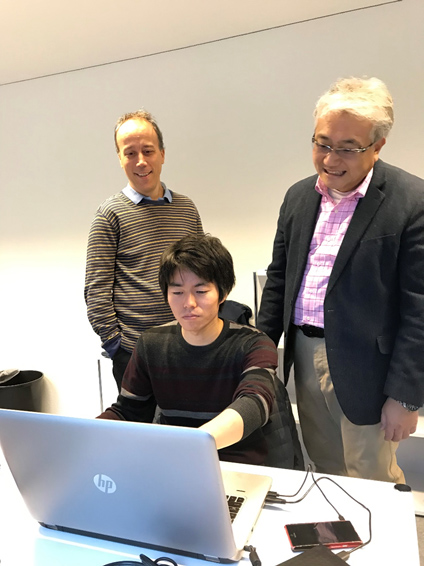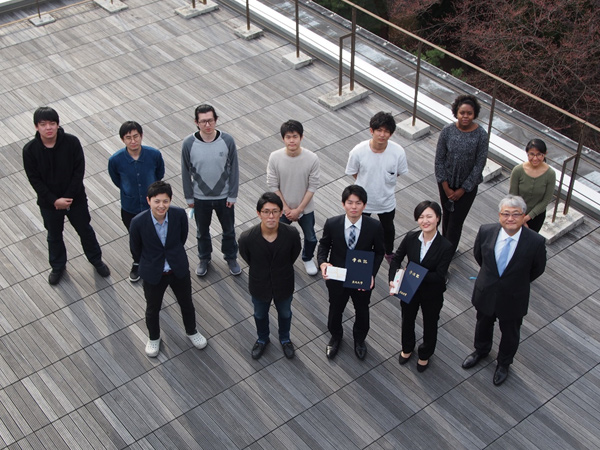Topics
2021.4.1
Messages from Alumni: 1st generation NGP graduates (March 2021)
Dr. Mariko ONODERA
Graduate School of Life Sciences
In April 2018, I have started my Ph. D. as the 1st generation student of the Neuro Global Program (NGP). I have been studying the mechanisms of epilepsy development, led by glial network plasticity at the laboratory of Super-network Brain Physiology (PI: Prof. K. Matsui). Throughout a full three years of my Ph. D. with tons of challenges and joys, NGP has offered many opportunities that encouraging us to become a global-minded researcher.
In March 2021, I have received my Ph.D. from the Tohoku University Graduate School of Life Sciences, and the Jointly-Supervised Degree from the Heinrich Heine University, Germany, as the completion of NGP. Now as a graduate, I’d like to share my experiences as a message for current and future NGP students.
Every NGP curriculum―such as the months’ of overseas training, brain science seminars, etc.―is absolutely valuable. Among them, the most unforgettable experience was the Neuro Global Special Overseas Training. In this training, NGP students can stay at overseas laboratory for approximately 6 months to establish their collaborative researches under the direction of the associated supervisor.
In my case, I stayed at the Heinrich Heine University (HHU; Düsseldorf, Germany), supervised by Prof. Dr. Christine R. Rose. Research in her laboratory focuses on neuron-glia interaction in relation to the extra- and intracellular ion signaling in the brain nervous system. In particular, they are expertized in utilizing the various ion measuring techniques including the ion concentration imaging and electrophysiological recordings.
As one of the major purpose for utilizing the Overseas Training was to get the essential data―experimental evidences of K+ clearance impairment in epilepsy model by performing the extracellular K+ recording―for my thesis, Prof. Rose’s laboratory was the perfect match.
From this experience, the first message here is simple: Do not give up until the end. During week days, I spent most of my time on the experiments to complete my experiments within the time limit. This might sound good, but in reality, was like a race against time. Moreover, not all of the experiments went well; for example, one day the hours of the experiment which began at 7:00 become spoiled, because the recording electrodes got lost stability at the middle of the measurement. This made me feel so frustrating, however I managed not to throw this up until the end of the stay. Fortunately, it turned out that I could get enough results having essential implications to conclude my thesis; epileptiform activity could acutely impair K+ clearance (Onodera et al., 2021, Journal of Neuroscience). In addition to the patience, this couldn’t be accomplished without the help of people around me. Words cannot express my gratitude enough.
The second thing I’d like to recommend you is to find something fun, or whatever makes you feel relaxed. This is how I dealt with the pressures, and I believe this may actually help you. You might sometimes feel so stressed during your coming overseas training. It could be because of the failure in your experiments or the differences in culture and lifestyle. What relieved me the most was the time spent with my friends. During the week days I managed to make time for lunch with them at the university cafeteria. On every weekend I went outside exploring the city. I especially like the Old Town where hundreds’ of shops, restaurants, bars and breweries line the streets. I also enjoyed visiting events, churches, and museums. Every moment was so exciting and memorable. Those experiences removed my stresses and kept me moving forward.
This kind of long-term stay abroad is so rare and valuable experience. The way how you use your time is completely up to you. Personally, I think it would be the best to enjoy both inside and outside of the lab. I hope my advice will help you.
Needless to say the Overseas Training is worthwhile. In addition to this, NGP neuroscience lectures were also helpful. As lecturers are leading scientists from various research fields, these are good opportunities to broaden your knowledges and interests. Attending lectures that is out of your field does not seem necessary, but it actually does; What you learned from them might unexpectedly help you.
Based on my experience, I think it depends on you whether or not you make the best use of those valuable opportunities. Looking back, I should have utilized them more actively and effectively. Thus I hope you do as much as you can and wish you all the best. Finally, I appreciate all the people who supported me.


Dr. Yasutaka HONDA
Graduate School of Life Sciences
Dear NGP fellows,
I have received a Ph. D. degree at the Graduate School of Life Sciences as one of the first graduating students. I have conducted my research under the supervision of Professor Ken-Ichiro Tsutsui for six years. I would like to send a message to my fellow students of NGP, looking back on my research activities and student life.
When I got assigned to Tsutsui laboratory, I joined a team that conducted neurophysiological experiments using a cognitive behavioral task, as I was interested in the brain mechanisms of cognitive functions. In this project, monkeys were trained to choose an action based on the information of memorized categories and current rules, and the single neural activity during the task performance was recorded and analyzed. The team had found neural activities related to category recognition, and the task design was very sophisticated and interesting, and therefore I was very motivated to work on it. I learned various techniques such as construction of experimental setup, computer programming, and animal training for task performance. But unfortunately, I could not obtain good neural signals due to various technical problems. Unsuccessfulness of the long-lasting challenge gradually forced me to feel mental stress, and I even developed an allergy to the latex gloves I was using for the experiment. In the end, by the time I graduated from the master's course, I had not achieved any of the results I had expected, and I felt myself unsuitable for research, mentally or physically. I began to think of giving up my research and looking for a job. However, Professor Tsutsui advised me to take a break from physiological experiments and continue my research by shifting to computational data analysis. The research theme was to investigate the working mechanisms of transcranial magnetic stimulation (TMS). Transcranial magnetic stimulation (TMS) is a method of non-invasive brain stimulation that induces electric current in the brain by making rapid changes in magnetic field by a coil placed on the skull. It has been empirically shown that repetitive TMS (rTMS) of specific brain regions can generate a sustained therapeutic effect in patients with major depression, Parkinson’s disease, and chronic pain. However, the fundamental mechanisms how rTMS alters brain activity and how it takes therapeutic effects remain unknown.
Another team in the lab had begun experiments using monkeys as a human model to record changes in brain activity induced by rTMS from a series of electrode implanted under the dura. However, due to the huge volume of data, detailed data analysis had not been started yet. So, I decided to take advantage of my computer programming skills to perform analysis. First, I was able to find that high-frequency rTMS increased the gamma-frequency component of brain activity, and low-frequency rTMS decreased the beta-frequency component of brain activity. This result was expected to some extent based on past studies, and therefore gave me some confidence. In addition, as I was looking into the data every day, I discovered that there was a characteristic neural activity occurring 5 milliseconds after the single-pulse TMS. This was something I had not expected at all. This neural activity, which we named P5 for convenience, was thought to reflect the firing activity of a group of cortical pyramidal neurons, since it coincided with the peripheral EMG with a high probability when it occurred in the primary motor cortex. Since the population firing of pyramidal neurons suggests that the local neural circuits were sufficiently excited to send out the excitatory information to other brain regions, P5 could be an indicator of the effect of rTMS on neural activity, which has been difficult to quantify so far, and hence "the effect of rTMS treatment", which could be a major guideline for future clinical and experimental applications of rTMS. Repeated discussions on the interpretation of P5, with Alia Benali at the University of Tübingen, Prof. Sven Bestmann at the University of London, and other professors conducting TMS experiments around the world, convinced us that it is an important discovery indeed. Then I finally began to feel glad that I had changed my research topic and moved on to a Ph.D course.
When these results had just begun to be obtained, I stayed in the laboratory of Dr. Philippe Tobler at the University of Zurich, as part of NGP's overseas training program, to learn techniques for analyzing big data obtained by simultaneous multi-channel recording of neural activity. I met and talked with researchers from all over the world there, and sometimes they listened to me talking about my research. It really helped my research, and I was greatly inspired. Surrounded by so many talented researchers of my generation who were passionate about their research, I became motivated to work. I think it was a great gain for me to be able to work as a member of the international community and to try my best to be as good as my peers around the world. Also, I cannot thank Prof. Tobler enough for giving me the experience of challenging myself to learn new skills overseas, which gave me a great sense of accomplishment and confidence.
Throughout the six years of my research life, there were some hard times, but I could gain valuable experiences and make a scientific achievement. I understand that it was not possible without the guidance of my supervisor, Professor Tsutsui, and the support of everyone at NGP. After graduation, I will leave the academic field, but I will continue to work in the accounting and auditing industry as a data scientist, using the data analysis skills I have gained through my research. After graduation, I will leave the academic field, but I will continue to work in the accounting and auditing industry as a data scientist, using the data analysis skills I have gained through my research. I hope to make full use of the experience I have gained to make a significant contribution to society. I would like to express my heartfelt gratitude to all those who have given me guidance and support. I also wish all of you who are currently enrolled in the NGP and those who aim to be, a fruitful research life.

Discussion with Prof Philippe Tobler and Prof Ken-Ichiro Tsutsui in Tobler Lab at Zurich University.

With members of Tsutsui Lab, on the graduation day.
